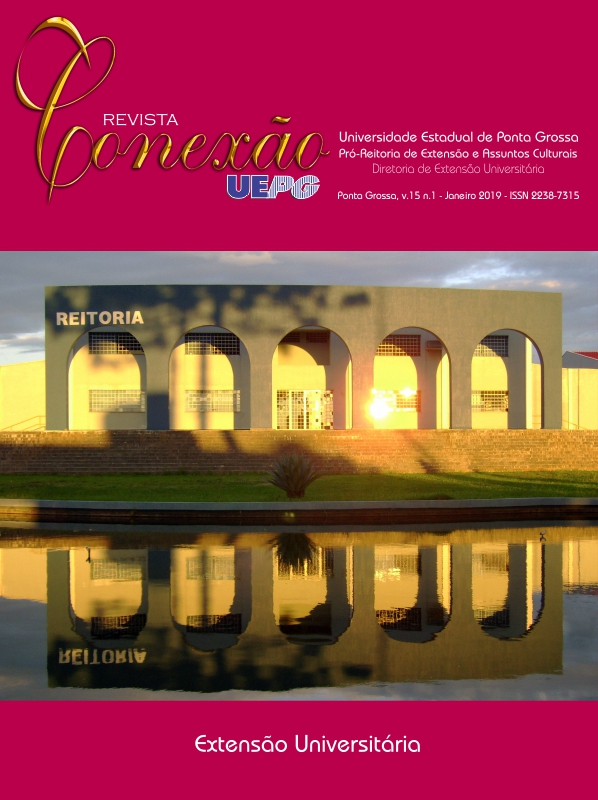LITERACY IN THE 6TH GRADE OF ELEMENTARY EDUCATION: A SPACE UNDER CONSTRUCTION
DOI:
https://doi.org/10.5212/Rev.Conexao.v.15.i1.0006Keywords:
Literacy, 6th grade of Elementary Education, Initial and continuing teacher education.Abstract
This article is based on outcomes of the outreach project "Pull out classes for Portuguese Learning for 6th grade students at Elementary Education: a complementary space for literacy". The project is part of the outreach program "Laboratório de Estudos do Texto – Laboratory for Text Studies” from the State University of Ponta Grossa. The article aims to present the literacy problems faced by 6th grade students at Elementary Education in the municipality of Ponta Grossa – PR. The study integrates research, teaching and outreach activities and aims to analyze the data collected from nine classes of 6th grade students at Elementary Education in three mainstream state schools in 2017 in order to diagnose the levels of literacy. Another aim is to review the literature about the concepts related to literacy. An online databank is being organized and it will be available to teachers from basic education and higher-level institutions.
Downloads
References
BAKHTIN, M. V. Os gêneros do discurso. In: Estética da criação verbal. Tradução de Paulo Bezerra. São Paulo: Martins Fontes, 1992. p. 367-392.
BAZERMAN, C. Gêneros textuais, tipificação e interação. São Paulo: Cortez, 2006.
DASCAL, M. Interpretação e compreensão. São Leopoldo: Editora Unisinos, 2006.
DUARTE, L. F.; ANDRÉ; T. C. Literatura infantil na hora do conto: a importância da leitura silenciosa e oral segundo Vigotski. 1º SIMPÓSIO NACIONAL DE EDUCAÇÃO. XX SEMANA DE PEDAGOGIA. 11, 12 e 13 nov. UNIOESTE, Cascavel, 2008. Disponível em: https://www.yumpu.com/pt/document/view/20251199/a-importancia-da-leitura-silenciosa-e-oral-segundo-vigotski-unioeste. Acesso em: 08 fev. 2018.
FERREIRA, R. L. Confabulando ideias de se trabalhar o gênero textual fábula em sala de aula: contribuições metodológicas. Dissertação. (Mestrado Acadêmico em Metodologias para o Ensino de Linguagens e suas Tecnologias). Universidade do Norte do Paraná. Londrina, 2015.
LIMA, R. de M. R.; ROSA, L. R. L.O uso das fábulas no ensino fundamental para o desenvolvimento da linguagem oral e escrita. CIPPUS – Revista de Iniciação Científica do UNILASALLE, v. 1, n. 1, mai. 2012.
LÖBLER, D. A. D.; FLÔRES, O. C. As profundezas da compreensão: as inter-relações entre interpretação, compreensão e significado. Revista Signo. Santa Cruz do Sul, v. 35, n.59, p. 181-196, jul. - dez. 2010.
MARCUSCHI, L. A. Produção textual, análise de gêneros e compreensão. São Paulo: Cortez, 2008.
MENEGASSI, R. J.; CHAVES, M. I. A. O título e sua função estratégica na articulação do texto. Linguagem & Ensino, v. 3, n. 1, p. 27- 44, 2000.
MOLLICA, M. C. et al. O letramento de sujeitos típicos e atípicos. In: Práticas de Ensino do Português. São Paulo: Contexto, 2012.
PARANÁ. Secretaria de Estado da Educação. Projeto Político Pedagógico. Documento de uso interno. Ponta Grossa, 2010.
ROJO, R. H. R. Letramentos múltiplos, escola e inclusão social. São Paulo, SP: Parábola Editorial, 2009.
TOLEDO, L. S. Alfabetismo funcional, linguagem e inclusão social. Leituras Transdisciplinares de Telas e Textos. Belo Horizonte, v. 5, nº 10, p. 10 - 22, 2009.
SOARES, M. B. Letramento e alfabetização: as muitas facetas. Revista Brasileira de Educação, nº 25, jan. - abr. 2004. Disponível em: http://portal.mec.gov.br/ultimas-noticias/211-218175739/47191-base-nacional-determina-que-criancas-sejam-lfabetizadas-ate-o-segundo-ano-do-fundamental. Educação Básica. Quinta-feira, 06 de abril de 2017, 19h41. Acesso em: 08 fev. 2018.
Downloads
Additional Files
Published
Issue
Section
License
a) Authors retain copyright and grant the journal right of first publication with the work simultaneously licensed under a Creative Commons Attribution License that allows others to share the work with an acknowledgement of the work's authorship and initial publication in this journal.
b) By submitting an article to the Revista Conexão UEPG and having it approved, the authors agree to assign, without compensation, the following rights to the Journal: the rights of first publication and the rights to redistribute the article and its metadata to the indexing and reference services that the editors deem appropriate.
c) Readers are free to transfer, print out and use the articles published in the Journal, as long as there is always explicit mention to the author(s) and to the Revista Conexão UEPG and as long as there is no alteration of the original work. Any other use of the texts needs to be approved by the author(s) and by the Journal.






